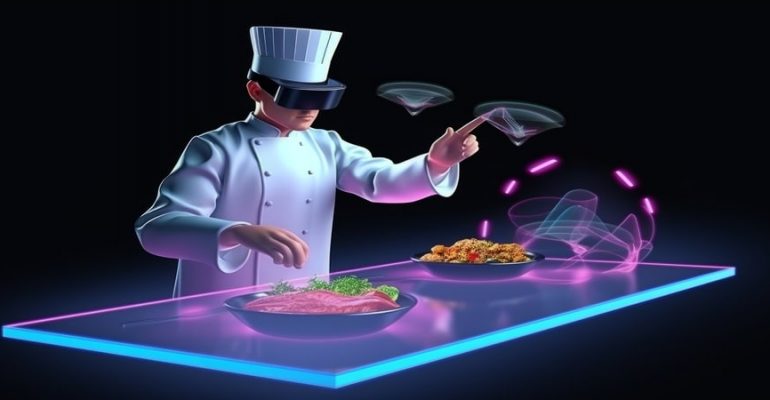
Metaverse: Transformation of Culinary Experience

Metaverse: Transformation of Culinary Experience
Metaverse has rapidly evolved from a futuristic concept into a tangible reality, transforming various industries such as gaming, retail, and education. One of the most intriguing spaces it is poised to revolutionize is the food industry. With the rise of advanced virtual and augmented reality platforms, food brands, restaurants, and culinary enthusiasts are stepping into the Metaverse to redefine experiences, operations, and customer engagement.
Metaverse Applications in the Food Industry
Integration of Metaverse with the food industry has unlocked innovative use cases that redefine traditional dining and culinary experiences:
1. Virtual Restaurants and Dining Experiences – Imagine savouring a dish in a virtual Parisian café or enjoying a meal in a fantasy setting designed by your favourite chef. Virtual reality (VR) dining experiences are already being explored by restaurants seeking to offer customers a unique and unforgettable experience. Customers can immerse themselves in themed environments while enjoying curated dishes delivered to their homes.
2. Digital Culinary Classes and Events – Aspiring chefs and food enthusiasts can participate in interactive cooking classes hosted in the Metaverse. These classes utilize avatars, haptic feedback, and spatial computing to simulate hands-on learning in virtual kitchens. Celebrity chefs can also host live events, reaching audiences globally without geographical constraints.
3. Virtual Food Festivals and Tastings – Food brands can create Metaverse-based food festivals where participants can virtually attend, explore, and taste cuisines through a combination of augmented reality (AR) and sensory technology. These festivals eliminate logistical barriers, allowing global audiences to connect with culinary cultures.
4. Enhanced Marketing and Brand Engagement – Leading food brands are leveraging Metaverse platforms to build interactive advertisements, gamified brand promotions, and digital storefronts. Customers can explore virtual grocery stores, learn about products, and make purchases that are delivered to their doorsteps in the real world.
5. Digital Twin Technology in Supply Chain Management – Restaurants and food producers can utilize digital twin technology in the Metaverse to monitor, optimize, and visualize their supply chain processes. This ensures operational efficiency and allows companies to make data-driven decisions in real time.
Benefits of the Metaverse in the Food Sector
Metaverse provides several advantages for food businesses:
Customer Engagement: Immersive experiences in the Metaverse captivate customers and foster brand loyalty.
Global Reach: Companies can connect with audiences worldwide, breaking geographical barriers.
Cost Efficiency: Virtual events and training programs significantly reduce operational costs compared to physical setups.
Sustainability: Virtual platforms minimize resource consumption and waste, aligning with sustainability goals.
Key Players and Innovations:
Several trailblazing companies and developers are shaping the intersection of the Metaverse and the food industry. Metaverse development companies are partnering with food brands to build customized virtual experiences that align with their marketing strategies. These collaborations are powered by advanced technologies such as spatial computing, blockchain, and haptic feedback.
Role of Metaverse Development Companies:
Metaverse development companies play a pivotal role in this transformation. These firms design, develop, and implement virtual platforms tailored to the unique needs of the food industry. From creating lifelike 3D environments to integrating sensory elements for realistic dining experiences, Metaverse developers are at the forefront of innovation.
Sapizon Technologies, a leading Metaverse development company, has collaborated with food brands to deliver immersive solutions that redefine customer engagement. By leveraging cutting-edge tools and creative strategies, companies like Sapizon are enabling the food industry to thrive in the digital age.
Challenges and Future Outlook
Despite its potential, adopting the Metaverse in the food industry poses challenges:
Technological Barriers: Implementing AR, VR, and haptic feedback systems requires significant investment and technical expertise.
Sensory Limitations: Replicating taste and smell in virtual environments remains a technological hurdle.
Accessibility: Ensuring the Metaverse is accessible to a diverse audience is crucial for its widespread adoption.
Looking ahead, advancements in wearable technology, digital twinning, and AI-driven customization are expected to address these challenges. The collaboration between food brands and leading Metaverse development companies will further drive innovation and adoption.
Conclusion
Metaverse is revolutionizing the food industry by merging technology with culinary art, creating experiences that were once unimaginable. From virtual dining and cooking classes to enhanced supply chain management, the possibilities are endless. As Metaverse developers continue to push the boundaries of innovation, food businesses must seize this opportunity to reimagine their offerings and engage with the next generation of consumers.
Partnering with a leading Metaverse development company is key to unlocking the full potential of this digital frontier. Whether you’re a restaurant owner, food producer, or culinary artist, the Metaverse is your gateway to a future where technology and gastronomy intertwine seamlessly.